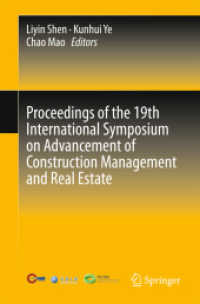Full Description
Despite what your students may have learned in Schoolhouse Rock, the textbook "how-a-bill-becomes-a-law" scenario is a rarity. As evidenced with health care reform legislation, most major measures wind their way through the contemporary Congress in what Barbara Sinclair has dubbed "unorthodox lawmaking."
Whatever path a bill takes—whether considered by multiple committees or subjected to a filibuster in the Senate—Sinclair explores the full range of special procedures and processes that make up the legislative process, as well as the reasons these unconventional routes evolved.
This much-anticipated fourth edition updates the book through the end of the 111th Congress. Sinclair incorporates new examples and new case studies throughout, including the economic stimulus bill of 2008, the American Recovery and Reinvestment Act of 2009, and, of course, the health care reform legislation of 2009-2010. New coverage also includes recent developments in the Senate (for example, filling the amendment tree); major changes in how the House and Senate resolve their differences (fewer conferences and more informal bargaining and amendments); and earmarks and changes in the appropriations process.
With Sinclair's unique perspective, Unorthodox Lawmaking introduces students to the intricacies of Congress while also providing the tools to assess the relative successes and limitations of the legislative process.
Contents
Clean Air: An Introduction to How the Legislative Process Has Changed
Multiple Paths: The Legislative Process in the House of Representatives
Routes and Obstacles: The Legislative Process in the Senate
Getting One Bill: Reconciling House-Senate Differences
Omnibus Legislation, the Budget Process, and Summits
Why and How the Legislative Process Changed
A Tale of Two Stimuli: The Bush/Pelosi/Boehner Stimulus Bill of 2008 and the American Recovery and Reinvestment Act of 2009
Making Nonincremental Policy Change through Hyper-Unorthodox Procedures: Health Care Reform in 2009-2010
The Republican Tax Cutting Agenda and the Budget Process: The Bush Tax Cuts 2001 and 2003
The Consequences of Unorthodox Lawmaking







